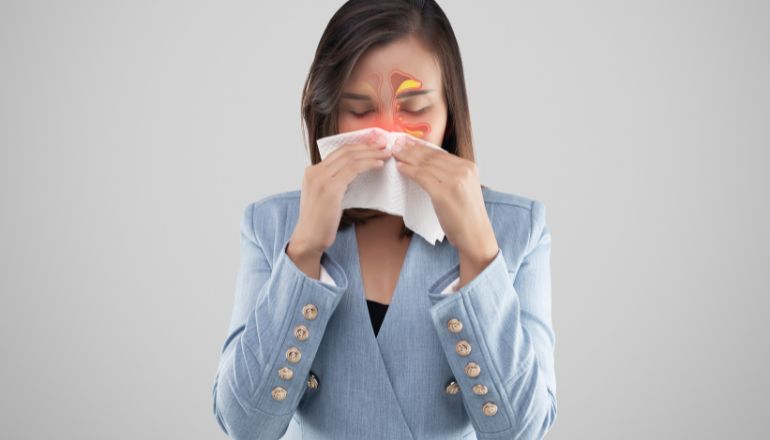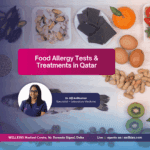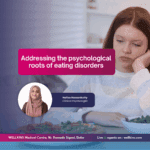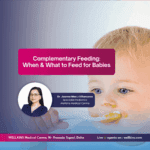Author: Dr.Preethi Sarma (ENT Specialist – WELLKINS Medical Centre)
Sinusitis is a condition in which the cavities around our nasal passages (sinuses) are inflamed and swollen. This interferes with the drainage of the sinuses and causes mucus to build up. It may cause some difficulty to breathe through the nose. The area around the eyes and face may feel swollen and we may have throbbing facial pain or a headache.
Acute sinusitis is most often caused by the common cold. Other triggers include nasal allergies, atmospheric pollution, dust, smoke etc. Poor general health conditions and systemic disorders like Diabetes predispose to recurrent and severe sinus infections. Treatment of acute sinusitis depends on the cause. In most cases, home remedies are enough. However, sometimes sinusitis can lead to serious infections and other complications. Sinusitis that lasts more than twelve weeks or keeps coming back is called chronic sinusitis.
Symptoms of Sinusitis include:
- Headache
- Drainage of a thick, yellow, or greenish discharge from the nose or down the back of the throat
- Nasal obstruction or congestion
- Pain, swelling, and pressure around eyes, cheeks, nose, or forehead
- Reduced sense of smell and taste
- Cough, which may be worse at night
Other signs and symptoms include:
- Ear pain
- Aching in the upper jaw and teeth
- Bad breath
- Fatigue
- Fever
Cause of Sinusitis
- Viral infection: The most common cause is viral rhinitis followed by bacterial invasion.
- Swimming and diving: Infected water can enter the sinuses causing infection. The high content of Chlorine gas in swimming pools can also set up chemical inflammation.
- Injuries involving sinuses.
- Dental infections: this applies to the maxillary sinus. Infection from the molar or premolar teeth or their extraction may be followed by sinusitis.
Predisposing Causes of sinusitis
Some health conditions can increase the risk of getting a sinus infection. The following are some of the conditions which can interfere with the drainage of the sinuses, leading to stasis of secretions followed by infection:
- Nasal Allergies
- Nasal polyps or tumors
- Deviated nasal septum
- Stasis of secretions in the nasal cavity and nasopharynx (eg: Enlarged Adenoids)
- Sinusitis is common in cold and wet climate.
Atmospheric pollution, smoke, dust, overcrowding, poor general health, systemic disorders like Diabetes, immune deficiency syndromes etc also predispose to sinus infection.
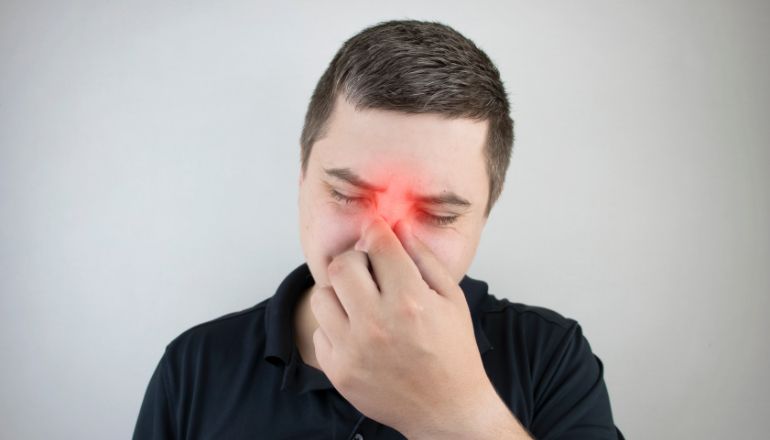
Complications of acute sinusitis include:
- Chronic sinusitis: Acute sinusitis may be a flare-up of long-term chronic sinusitis.
- Meningitis, Brain abscess: This occurs when the infection spreads to the lining of the brain/brain.
- Eye complications: If the infection spreads to the eye socket, it can cause eyelid swelling, pus collection inside the orbit, cranial nerve involvement, and even total blindness. This is a medical emergency that requires immediate treatment.
- Ear infections
- Pharyngitis, tonsillitis, persistent laryngitis, etc
Sinusitis is a common condition that affects millions of people around the world. Sinusitis can develop suddenly and cause severe discomfort. Fortunately, there are steps you can take to prevent acute sinusitis and reduce the risk of getting it in the first place.
Tests and diagnosis of Sinusitis
Doctors rely on different methods for the diagnosis of Acute sinusitis.
- Physical Examination.
- Nasal endoscopy: A thin, flexible tube (endoscope) with a fiber-optic light is inserted through the nose to visualize the nasal cavity and sinuses.
- X-ray of the sinuses
- Other Imaging Studies: Computerized tomography (CT) or magnetic resonance imaging (MRI) can show details of the sinuses and nasal area. Though not recommended for uncomplicated acute sinusitis, imaging studies may help to identify developmental abnormalities or suspected complications.
- Nasal and sinus swab cultures: Laboratory tests are generally unnecessary for diagnosing acute sinusitis. However, in cases in which the condition fails to respond to treatment or is progressing, swab cultures may help to pinpoint the cause, such as identifying a bacterial cause.
- Allergy testing: If an underlying allergy is suspected, an allergy skin test may be recommended. A skin test is safe and quick and can help pinpoint the allergen that is responsible for your nasal flare-up.
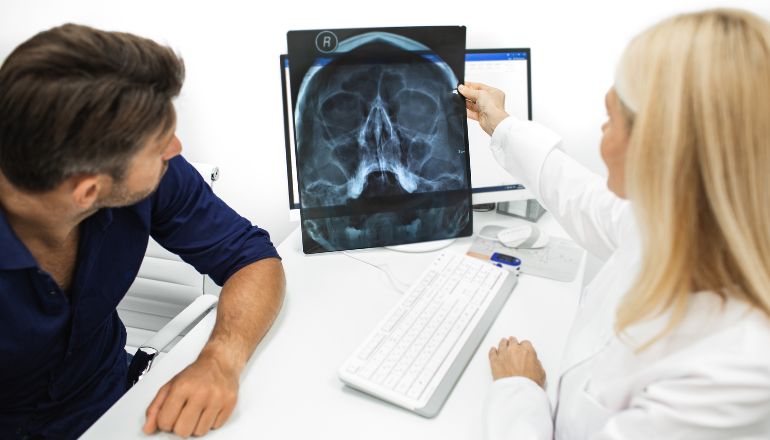
Treatment of Sinusitis
Self-care techniques are needed for speedy recovery and ease of symptoms.
Lifestyle and home remedies
These self-help steps can help to relieve sinusitis symptoms:
- Rest: This will help our body to fight infection and to recover fast
- Drink plenty of fluids such as water or juice. This will help to dilute mucous secretions and promote drainage. Drinking alcohol can worsen the swelling of the lining of the sinuses and nose.
- Moisten the sinus cavities. Drape a towel over the head and breathe in the vapor from a bowl of hot water. Keep the vapor directed towards the face. Or take a hot shower, breathing in the warm, moist air. This will help to ease pain and help mucus drain.
- Apply warm compresses to the face. Place warm, damp towels around the nose, cheeks, and eyes to ease facial pain.
- Rinse out the nasal passages: Using a specially designed squeeze bottle (Sinus Rinse) or neti pot. Saline (saltwater) nasal wash helps to clear out mucus and flush out debris and allergens. Now, different concentrations of saline nasal sprays are widely available.
- Sleep with the head elevated. This will help our sinuses drain, reducing congestion.
The prevention and relief of Sinusitis
Take these steps to help reduce the risk of getting sinus infections
- Avoid upper respiratory infections. Minimize contact with people who have colds.
- Wash your hands frequently with soap and water, especially before your meals.
- Carefully manage your allergies. Work with your doctor to keep symptoms under control.
- Avoid cigarette smoke and polluted air. Tobacco smoke and other pollutants can irritate and inflame your lungs and nasal passages.
- Use a humidifier. If the air in your home is dry, as if you have forced-air heat, adding moisture to the air may help prevent sinusitis. Be sure the humidifier stays clean and free of mold, with regular, thorough cleaning.
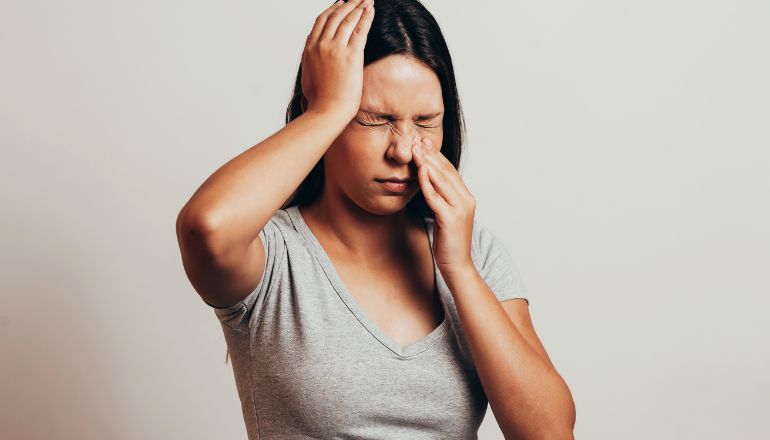
If your doctor does prescribe antibiotics, it is essential to take the entire course of medication. Generally, this means you’ll need to take them for 7 to 10 days even if your symptoms get better. If you stop taking them early, your symptoms may come back.
Sinusitis is a common condition that can cause significant discomfort and inconvenience. By maintaining good hygiene practices, avoiding exposure to pollutants and irritants, and staying hydrated, you can reduce the risk of developing sinusitis. If you do experience symptoms of sinusitis, it’s essential to see your healthcare provider for a proper diagnosis and treatment plan. With the right prevention strategies and treatment options, you can breathe easily and say goodbye to sinus pain


